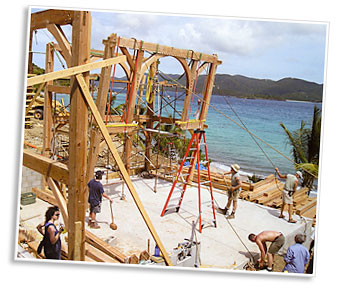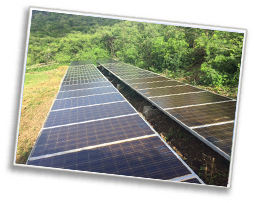|
|||
Lovango Beach House is totally off the grid; self-generating green energy by utilizing 42 voltaic solar panels that produce over 7000 watts of power in addition to a back up 6-kilowatt diesel generator. True Green Lovango Cay, an off the grid island (no public utilities), is about a mile and a half north of Cruz Bay, the largest town on St. John. The house itself, at 2100 square feet, has in its construction stone and shells found on the property and around the island. The house itself - not all that large at 2100 square feet - was built from stone and shells found on the property - not really a mountain, but plenty hilly and plenty rocky. The frame of the house and the beams that support the 27-foot ceiling are reclaimed fir from pilings of old 1800s railroad trestles that spanned the Great Salt Lake. The wood, having been under water for over 100 years is highly impregnated with salt and thus termite proof. The floors inside are from old Chicago brick and reclaimed old growth New Hampshire pine. All the exterior decking is made from combined recycled plastics and wood fibers. A team of workers from Illinois, who cut the timber frame, spent a week on Lovango Cay hand-raising the massive beams for the framework of the house. A local architect and contractor completed the rest of the work.
Most interesting is the use of solar to power the house, and rain catchment cisterns to provide potable water. There is an 18,000 gallon rain catchment cistern beneath the main house and a 2,000 gallon one beneath the stone guest cottage that was the original building on the property. A solar hot water system provides the majority of the hot water that is needed. The electric power for the house and cottage comes from a good-sized array, over 7000-watts, of solar panels that provide direct current to a (3,200 amp hour, 24 volt) bank of storage batteries. Two 4-kilowatt inverters then invert the stored direct current into alternating current for use in the house for lighting, refrigeration, ceiling fans and whatever else is needed. A large diesel back-up generator is automatically started by the inverters to recharge the batteries if two or three consecutive sunless, windless days cause the batteries to decrease in stored power. When the batteries are recharged the inverters turn off the generator. Lovango Beach House is bi-level to keep its footprint small. A beautifully landscaped walkway of steps from the dock lead to the screened sitting area of the great room and kitchen. A bedroom, bath and loft are up another level that wrap around the great room. While screening covers all the windows, unique built-in electric shades can be lowered to shield guests from inclement weather continuing to allow a view of the water and St. John. |


 Propane
gas for the stove and laundry dryer and the use of cell phones round out all the necessities
needed for complete off grid living.
Propane
gas for the stove and laundry dryer and the use of cell phones round out all the necessities
needed for complete off grid living.